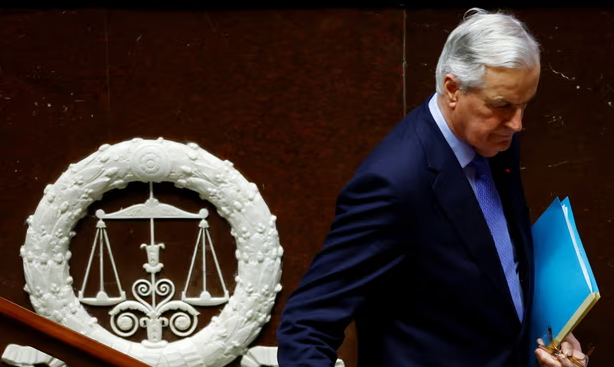|
|
TODAY.AZ / Analytics
Macron’s crisis deepens as pro-Armenian PM Barnier resigns
05 December 2024 [20:07] - TODAY.AZ

by Ulvi Nariman
The recent dismissal of Michel Barnier as French Prime Minister, following a no-confidence vote in the National Assembly, has marked a significant turning point in France's political landscape. While this development underscores Emmanuel Macron's dwindling influence, it also sheds light on the trajectory of French foreign policy under his administration—particularly in relation to Azerbaijan.
Barnier, a close ally of Macron, has been a prominent figure in shaping France’s pro-Armenian stance. His ties to the Armenian lobby, as well as his controversial visits to Garabagh during Azerbaijan’s territorial occupation, highlight his unwavering alignment with separatist factions. In 2021, for instance, Barnier, accompanied by former presidential candidate Valérie Pécresse, illegally traveled to Garabagh and held meetings with separatist leaders, overtly supporting their cause.
Macron-Driven Policy: He might be next!
At the heart of the Paris-Baku tension lies Macron himself. As France’s president, he holds the ultimate authority in defining foreign policy and forming governments. His administration’s consistent pro-Armenian stance—exemplified by Barnier’s actions—has alienated Azerbaijan and created a strained bilateral relationship. Even with Barnier’s dismissal, expectations for a shift in foreign policy remain unrealistic, given Macron’s overarching influence.
The current situation reflects deeper systemic issues in Macron’s leadership. The no-confidence vote against Barnier’s government follows the dissolution of parliament earlier this year, marking another political debacle for the president. Critics, including Marine Le Pen, leader of the National Front party, have not held back in pointing fingers at Macron, calling for his resignation. Le Pen emphasized that the crisis is emblematic of Macron’s seven years of failed leadership, which has left France grappling with instability both domestically and internationally.
In the big picture, Barnier's replacement is unlikely to lead to a significant change in policy. Macron’s administration has consistently used its platform in international organizations, including the EU, to criticize Azerbaijan. Barnier’s close relationship with the Armenian lobby only amplified this trend, solidifying France’s role as a key advocate for Armenian interests.
Barnier’s actions—including his illegal visits to Garabagh and overt support for separatist leaders—have left an indelible mark on Azerbaijan-France relations.

The political turmoil surrounding Barnier’s dismissal not only signals Macron’s weakening grip on governance but also raises questions about France’s strategic direction. Macron’s inability to stabilize his government or foster effective diplomacy has placed France in a precarious position on the global stage. As the French leader faces mounting domestic criticism, the implications of his policies—both at home and abroad—continue to reverberate.
With Barnier’s departure, France must navigate its way through a period of uncertainty, one that could redefine its relations with Azerbaijan and reshape its foreign policy priorities. However, as long as Macron remains at the helm, a substantial shift appears unlikely!
URL: http://www.today.az/news/analytics/255390.html
 Print version
Print version
Connect with us. Get latest news and updates.
See Also
- 18 April 2025 [20:14]
Armenia’s “Crossroads of Peace” lacks substance to deliver regional integration - 18 April 2025 [13:58]
Truth hurts: Armenian media panics after FM’s sovereignty slip-up - 16 April 2025 [19:00]
Baku, Tbilisi: Strategic partners at crossroads of Eurasia - 16 April 2025 [14:42]
Yerevan conceals diplomatic trap for Baku behind peace push - 15 April 2025 [20:12]
Azerbaijan drives strategic transformation of Turkic Council amid global shifts - 14 April 2025 [08:30]
South Caucasus peace paves way for deeper EU–Central Asia integration - 13 April 2025 [13:56]
Armenian FM struggles to defend his country’s constitution - 12 April 2025 [15:15]
Azerbaijan’s strategic role in shifting global order: Deputy Gafarov weighs in - 10 April 2025 [08:30]
President Aliyev's address sets clear message to Armenia on peace at impasse - 09 April 2025 [13:11]
From crisis to cooperation: Azerbaijan’s role in Turkiye-Israel rapprochement
Most Popular
 Separatists & Pashinyan - the farce continues
Separatists & Pashinyan - the farce continues
 Antalya Diplomacy Forum becomes center of global dialogue
Antalya Diplomacy Forum becomes center of global dialogue
 4SIM signs MoUs with Chinese institutions to boost cooperation in green and industrial technologies
4SIM signs MoUs with Chinese institutions to boost cooperation in green and industrial technologies
 A fat, nosy and bald hint that Armenia will remove claims against Azerbaijan from the Constitution
A fat, nosy and bald hint that Armenia will remove claims against Azerbaijan from the Constitution
 Foreign diplomats tour liberated cities of Khankendi and Shusha
Foreign diplomats tour liberated cities of Khankendi and Shusha
 Collapse of "macaronism": Resignation of the "grey cardinal" of France may cause a chain reaction
Collapse of "macaronism": Resignation of the "grey cardinal" of France may cause a chain reaction
 Paris hosts debut of Azerbaijan’s first AI art “Shusha”
Paris hosts debut of Azerbaijan’s first AI art “Shusha”
